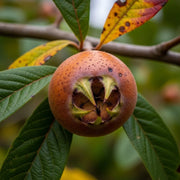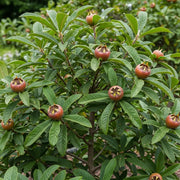Bring a touch of old-world charm and unique flavour to your garden with our exquisite range of Medlar trees. Perfect for the British climate, these fascinating fruit trees offer ornamental beauty alongside their distinctive, bletted fruit. Explore our selection and...
Bring a touch of old-world charm and unique flavour to your garden with our exquisite range of Medlar trees. Perfect for the British climate, these fascinating fruit trees offer ornamental beauty alongside their distinctive, bletted fruit. Explore our selection and choose the ideal Medlar tree for your outdoor space.







